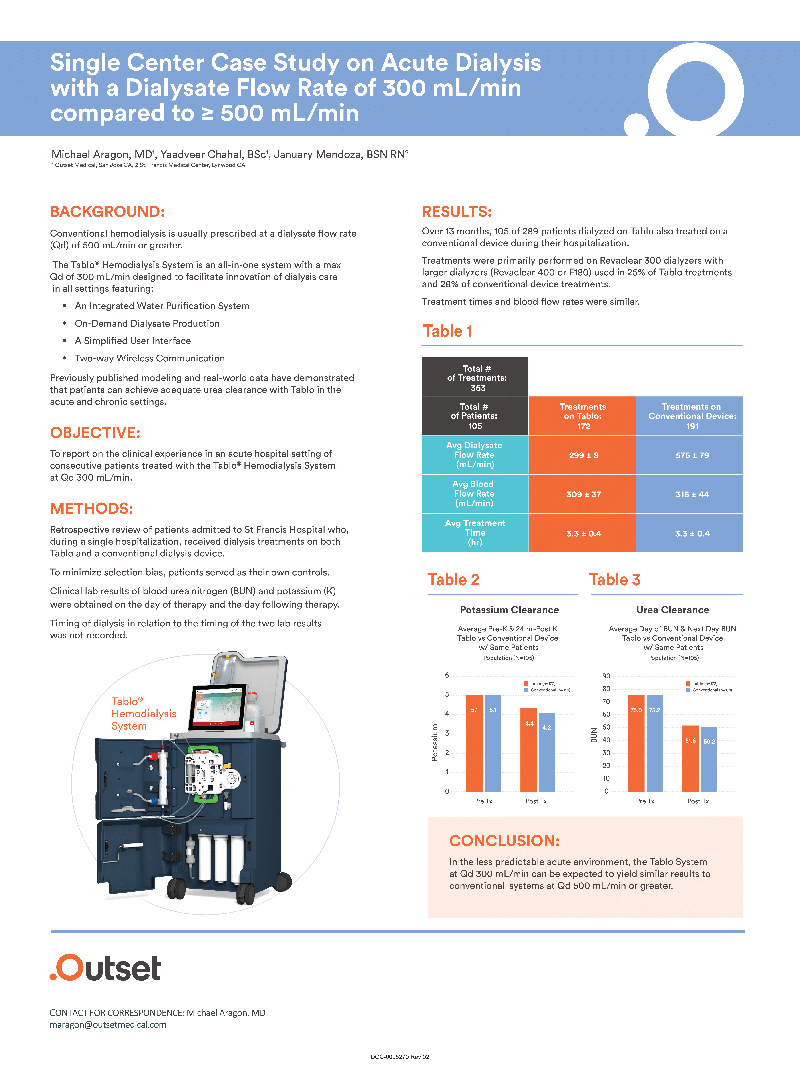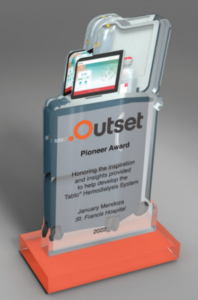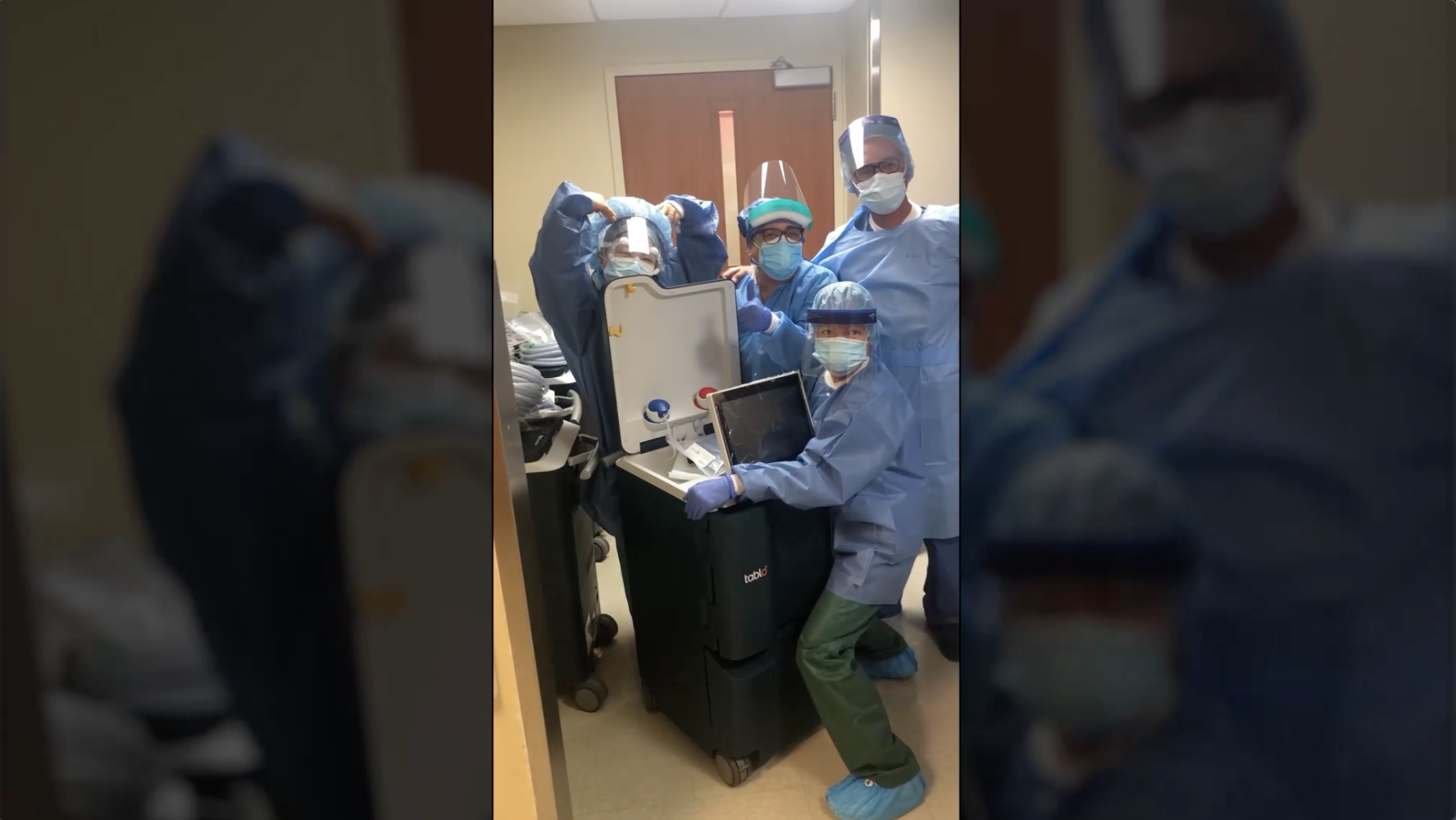A Pioneer of Change: Dialysis Director January Mendoza

Summary
January led a monumental transition when her hospital became the first in California to use a novel hemodialysis technology. To honor her essential role in the Tablo story, including conducting an important comparison study, she received the very first Outset Medical Pioneer Award.
January Mendoza, BSN, RN, the Regional Director of Acute Dialysis at St. Francis Medical Center (SFMC), a member of Prime Healthcare, in Lynwood, California, is a trailblazing nurse leader who isn’t content with the status quo. She entered the dialysis field in 2003 as a certified hemodialysis tech and then became a nurse in 2008, and today as a director she has managed teams using every type of machine available for acute dialysis care. Starting in late 2018, her facility became the first acute care hospital in California to use the Tablo Hemodialysis System. January played a key role in the use and staff acceptance of this first-of-its-kind dialysis technology that was brought in-house, after previously outsourcing these services to a third-party provider. And, January developed a powerful strategy to help get her nephrologists on board with the novel system: clinical data.
“I can see how far Outset has come with the technology over the years, and I’m excited that the team listened to our feedback and still makes updates to this day to many of the features that we asked for while we were using Tablo. I am proud that our work has helped dialysis teams around the country be able to benefit from the system’s ease of use and versatility” says January.
January, who also oversees the dialysis programs at four other Los Angeles area hospitals, sees herself as someone who is always open to trying new ideas, a critical attribute in the ever-evolving healthcare field. For this reason, she was excited about building her own in-house dialysis program with Tablo. She knew all too well that the field was stagnant, inefficient and in dire need of innovation. She also wanted to relieve some of the burden associated with operating traditional dialysis machines for her nurses, boost their positivity and confidence, and increase operational efficiencies for the hospital.
Tablo was introduced to SFMC’s leadership in mid-2018, and once the decision was made to end the hospital’s outsourced vendor relationship and insource Tablo, January was hired to oversee the program. “They gave me 6 to 8 weeks to insource our new program, which wasn’t much time,” she says. “The conversion to an in-house dialysis model was probably one of the most challenging but also rewarding experiences of my nursing career.”
January hired dialysis nurses and worked alongside the Outset team to quickly train them on Tablo. She did encounter some hesitation when the system was first implemented, as it is very different from the traditional machines that the nurses have used in the past.
“My nurses would come in for their shift, and choose the existing machines instead of Tablo. Many nurses don’t like to change the way that they have always done things, and they were comfortable with the older workhorse machines,” she says.
January then educated them on the vast differences between the systems, and how much less time and work it takes to use Tablo. “The conventional machines take a lot longer to set up,” she says. “With Tablo and its easy-to-follow touchscreen, a nurse can be up and running, from turning the machine on to starting a patient treatment, in 20 minutes. I also showed them that Tablo is much more portable and easy to fit anywhere we need it, with the integrated water purification and on-demand dialysate production.”
SFMC also completed a nurse staffing reorganization, and some chronic care nurses transitioned into acute roles. It was ideal timing for the Tablo implementation, as the incoming nurses wanted to learn something new. After the quick and easy training and successfully completing treatments on Tablo, January says that these nurses were excited about the new machines.
“They commented that Tablo is so easy to use and set up, including the pre-strung cartridge,” she says. “It was awesome to see a ‘lightbulb moment’ with the staff as they learned about the capabilities of the new system. Their level of positivity influenced our existing acute staff, and then they too wanted to start using Tablo. Now when the nurses come in for their shift, they are choosing the Tablo machines instead of the others. That has been a nice change.”
January also encountered reluctance from some nephrologists, who were used to prescribing on the older machines.
“They were wary when we presented Tablo to them. Nephrologists, like nurses, can be very set in their ways, and accustomed to their workflow,” she says. “When they heard that the maximum dialysate flow rate was 300, they said, ‘how are our patients going to be adequately dialyzed?’”
It took time, commitment and persistence on January’s part to convince the nephrologists that Tablo is able to provide adequate clearance and comparable clinical results as compared to traditional dialysis machines. With the positive outcomes she had seen with Tablo to date, and the firm belief that the machine’s clinical flexibility and operational versatility would be able to stand up to the current standards of care, she took it upon herself to organize and run a side-by-side comparison of patient lab results following treatments on the traditional machines, versus Tablo.
“When we reviewed the data, we found very minimal difference in clearance when patients were treated on one machine or the other, even with the difference in dialysate flow rate. When we presented the data to our nephrologists, it was an eye-opener for them, and they started prescribing on Tablo,” she says.

January, working with the Outset Medical team, continued to collect data for more than a year, and co-authored a study entitled “Single Center Case Study on Acute Dialysis with a Dialysis Flow Rate of 300 mL/min Compared to ≥ 500 mL/min.” In the retrospective review, over 13 months, 105 of 289 patients dialyzed on Tablo were also treated on a conventional device during their hospitalization. Treatment times and blood flow rates were similar between the groups. The study concluded that the Tablo system at Qd 300 mL/min can be expected to yield similar results to conventional systems at Qd 500 mL/min or greater.
The St. Francis data helped to ease the biggest qualm of many nephrologists, and has contributed to the growing success and acceptance of Tablo across the country. And, additional studies have been based on this initial single-center data set.
Outset Pioneer Award Winner: January Mendoza, BSN, RN
 Outset Medical has created a new award to acknowledge and permanently honor the critical role of the early, intrepid pioneers that, because of their resolute fearlessness, fortitude and faith, patients’ lives are being improved today by the Tablo Hemodialysis System.
Outset Medical has created a new award to acknowledge and permanently honor the critical role of the early, intrepid pioneers that, because of their resolute fearlessness, fortitude and faith, patients’ lives are being improved today by the Tablo Hemodialysis System.
In recognition and appreciation of January Mendoza’s pioneering spirit, dedication, and faith in Tablo and Outset Medical, and her essential role in Outset’s story, on January 12, 2022, Outset’s CEO Leslie Trigg presented her with the very first Outset Pioneer Award. The award was presented during Outset’s virtual National Sales Meeting during a presentation entitled “Innovator in Acute Care: Perspective from a Regional Director of Dialysis with James Quen and January Mendoza.”
In accepting her award, January commented, “During our study, we spent a lot of time with Outset Medical engineering, product development and other teams. What they were working on was really uncharted territory. We’re proud to have come so far with Outset and Tablo. It’s rewarding to see the value of our hard work come alive, and to see the game-changing technology that it is today. Tablo has also taught me so much about myself and about teaching people ways to get out of their own heads, and shifting mindsets about the way dialysis care should be.”
About St. Francis Medical Center
A valued and trusted community resource, St. Francis Medical Center (SFMC), a member of the Prime Healthcare family of hospitals, was founded in 1945. St. Francis is dedicated to providing vital healthcare services for the 700,000 adults and 300,000 children who count on the hospital for high quality and compassionate medical care. St. Francis is recognized for its full range of diagnostic and treatment services in specialties including Cardiovascular, Surgical, Orthopedics, Maternal-Child Health, Behavioral Health, and Trauma and its broad array of outreach programs. St. Francis Medical Center is an Approved Primary Stroke Care Center and STEMI Receiving Center for Los Angeles County, verified Level II Trauma Center, and designated Baby-Friendly healthcare facility by Baby-Friendly USA.

